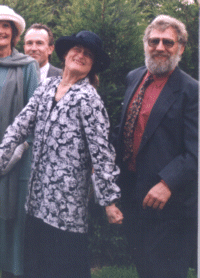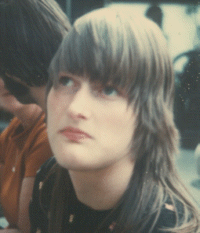|
||

 A £45 suicide
in a Zurich flat - where's the dignity in that?
A £45 suicide
in a Zurich flat - where's the dignity in that?
Following Dr Anne Turner's assisted death, a terminally-ill, disabled woman who contemplated taking her own life says why she now loathes the Dignitas creed
Thursday, 26th January 2006
by DAVID COHEN
AS GILLIAN GERHARDI watched television coverage of Dr Anne Turner's controversial assisted suicide this week, a barely controllable anger rose inside her. "Murderers!" she muttered. "We know about those Dignitas people! They give you a 40-minute consultation and then pass you a lethal prescription - they are the lowest of the low."
 Gillian, 50, a disabled mother of two and a university
graduate who lives with her disabled husband, Vic, 56, wondered:
how can this Dignitas bandwagon be stopped? Two years ago, she
contemplated a daring plot to expose their "inhumane practices"
by posing as a "suicide tourist" who would pull out
at the last moment, but eventually decided it would be too terrifying
for her.
Gillian, 50, a disabled mother of two and a university
graduate who lives with her disabled husband, Vic, 56, wondered:
how can this Dignitas bandwagon be stopped? Two years ago, she
contemplated a daring plot to expose their "inhumane practices"
by posing as a "suicide tourist" who would pull out
at the last moment, but eventually decided it would be too terrifying
for her.
"For a mad moment the other night, I thought again about taking that trip to Zurich," she says. "I thought to myself that things have got much worse, and that the only way to make my point was to book myself into their death flat, and then blow myself and Dignitas founder, Ludwig Minelli, sky high. I would become," she laughs wistfully, "the first anti-suicide suicide bomber."
Her body ravaged with cerebral palsy and latterly multiple sclerosis, the degenerative condition that will kill her, Gillian, whose arms are too weak to lift anything heavier than a TV remote, is an unlikely activist. Yet she is vociferous in her opposition to the Swiss clinic, admitting - through painfully slurred speech - that she feels angry with 66-year-old Dr Turner.
"Dr Turner had at least three years to live, she was not even disabled and she certainly wasn't anywhere near as bad as I am. Yes, her brain disorder meant she was going to deteriorate, but by killing herself, she was saying that life as a disabled person is not worth living.
"But I say - having been where Dr Turner was - life is worth living. When I was diagnosed with multiple sclerosis five years ago, I rapidly lost my ability to walk, to feed myself, to use the loo without assistance, and I was suicidal, too.
"Every day, for three months, I plotted to kill myself. I was going to ride my motorised wheelchair down on to the high road and into the path of a lorry. But by obtaining a full-time care assistant funded by social services, and by re-casting my life to see beyond my useless body, I came through that dark time. I paint, I run a disabled theatre company, I live a full life. The tragedy is - so could have Dr Turner."
But some 60 miles to the south, having also been glued to the broadcast of Dr Turner's last journey, Michael Irwin, 74, a retired Surrey GP, expresses radically different views. Irwin, one of the 673 British members of Dignitas, was recalling his own trip to Zurich when he accompanied a terminally-ill friend, a Glaswegian woman, to the same death flat. This act, illegal in this country, resulted in the General Medical Council striking him off the medical register last September.
"I don't regret that trip at all," Irwin says. "I remember landing at Zurich airport and the pilot wishing us all "a pleasant onward journey' and my friend saying: 'If only he knew where I was going.' She was amazing. So cheerful, so light, so determined to go ahead.
"Although I had helped five other people to get their paperwork in order for Dignitas, I'd never seen anyone actually commit suicide before. I found it fascinating. As a doctor, you learn to be emotionally detached. Being with her in that flat, I was amazed by how dignified and peaceful her death appeared to be."
But Irwin admits he would have felt ambivalent about accompanying someone like Dr Turner because, unlike his friend, she had not entered the final six months of her life.
"I felt sad for Dr Turner because if the law in this country was changed, then she wouldn't have had to take her life prematurely in a foreign country. She only went because she was afraid she'd lose the ability to swallow, because to commit suicide through Dignitas, which operates under Swiss law, you have to be able to swallow the barbiturates on your own."
Dr Turner is said to be the 42nd Briton to die with Dignitas since it was founded in 1998, but only the third, after Reginald Crew and John Close, to invite in the media. Her suicide has re-ignited the euthanasia debate in the UK ahead of Lord Joffe's Bill that aims to legalise assisted suicide only for the terminally-ill. It will go, once again, before the House of Lords in March.
Advocates of the Bill argue that it will introduce stricter safeguards, because organisations such as Dignitas are gung-ho and help people who are merely depressed to die.
The case of Robert and Jennifer Stokes, the Bedfordshire couple who committed suicide with Dignitas in 2003, and whose decision came as a shock to their family, provoked a storm of criticism. The couple were not terminally ill, but with their health declining they were said to be worried that nobody would look after them if the other died.
CASES such as this led Gillian Gerhardi, who lives in Aylesbury, Buckinghamshire, to contemplate - against her husband's better judgment - an undercover trip to expose Dignitas. All it took was a £45 enrolment fee attached to a two-page letter and Dignitas immediately posted her details of the documents she would need: birth certificate, marriage certificate, and two doctors' letters showing proof of her medical condition.
In Zurich, Dignitas said, she would meet a doctor who would check she was of sound mind, and that her intention was to die, before handing her a prescription for a lethal barbiturate. Then she would be driven to the Dignitas flat where the barbiturates would be prepared by a nurse, she would take them, and 25 minutes later, she would be dead.
But Gillian's opposition to assisted suicide goes beyond obviously flawed cases like the Stokes couple. She is against it even if the patient is terminally ill, she says. And to grasp why, you have to understand the philosophy she has fashioned out of her rollercoaster life.
She was born nine weeks premature with Athetoid cerebral palsy, to a middle-class farming family in Hertfordshire. She was the eldest of four children - her siblings were able-bodied (her youngest brother is an RAF pilot with the Red Arrows) - and despite her impaired speech and being unable to walk until the age of five, she attended a normal primary school.
 By her
early twenties. Gillian had a BA in social administration from
Sussex University and had met and married, Vic, a disabled computer
consultant, whose cerebral palsy was less obvious than her own.
They would have two strapping, able-bodied boys, Brett, now 28,
and Chris, 25.
By her
early twenties. Gillian had a BA in social administration from
Sussex University and had met and married, Vic, a disabled computer
consultant, whose cerebral palsy was less obvious than her own.
They would have two strapping, able-bodied boys, Brett, now 28,
and Chris, 25.
"Gillian was extremely active," recalls Vic. "When we went dancing, she was the one holding me up rather than the other way round. She lived a full life - her cerebral palsy made it impossible to hold down a regular job, but she ran a disabled theatre company, designed Christmas cards that she sold, and brought up the children."
The news in 2001 that Gill had developed a degenerative muscle condition came as a devastating shock. "One day I came home from the supermarket and my legs felt so weak I could hardly walk," she recalls. 'A specialist in London told me: `You've got multiple sclerosis. There is nothing we can do. Your muscles will gradually lose all connection with your brain, you will get weaker, but it could take three years or 25 years before you die.'
Gillian's deterioration was frighteningly rapid. She was soon confined to a wheelchair, unable to walk or even eat unassisted, and needing a hoist to get her into her bed. For two years, she fought to adjust, but psychologically she was starting to crumble.
"I'm a control freak and I couldn't handle it that I had become so reliant on my family," she says. "I became terribly depressed for three months, I would wake every day and think about how I was going to kill myself.
EVENTUALLY, with Vic's help, and with counselling, I began to realise that what I needed was more help from social services. All I had to do was ask. With a full-time carer, the change in my quality of life was enormous."
Gillian believes that one of the biggest problems that disabled or terminally-ill people face is that society makes them feel valueless, and they are unaware of the help they can command. "If the Stokes couple had realised that more care was available, then maybe they would not have gone to Zurich," she says.
"But part of it is coming to terms with what had happened to me and accepting that I could still do what I did before, but in a different way. For example, I realised that although I couldn't walk, I could still get around because I had a wheelchair and hoist. Vic and I still go out to the movies, the theatre - goodness, we even went on holiday to Manhattan last year."
Dr Irwin admits that disabled activists such as Gillian make a valuable contribution to the debate, but that there will always be those - albeit a small number - who will opt for assisted suicide and to be able to die with dignity.
But Gillian insists that the phrase "dying with dignity" is terribly misleading. "A dignified death is one where the person has fought for life and not taken the easy way out. I understand people are frightened of having a bad death full of suffering. But where did we get this idea that we are due a so-called dignified death?
"Much more important is that we live with dignity. And that means enduring hard times, overcoming obstacles, and seeing value in people - like me - who are terminally ill and disabled. And I, for one, intend to be around for some time yet."

 A full life: from above, cerebral palsy victim
Gillian Gerhardi graduating from Sussex University at the age
of 23. Left with her husband Vic in 1994, and at the age of 19.
A full life: from above, cerebral palsy victim
Gillian Gerhardi graduating from Sussex University at the age
of 23. Left with her husband Vic in 1994, and at the age of 19.
Hi Vic and Gill
Bit of a surprise that, reading my weekly Evening Standard (I buy it when I do the grocery shopping as only Tesco's round here sell it) and I thought I know that woman... and then I know that bloke! Ever done a double take?
Well done to Gill. As someone who's never suffered more than a cold or the occasional self inflicted hangover, I'm in no position to really understand the issues but I have thought about them before and I thoroughly admire your points of view - all life is precious. I definitely believe that.
My mother died when I was about nineteen, after a decade of very painful illness (she died of bone cancer) but I never remember her regretting a moment of her life. The care she was incredible and I would to think that someone might have encouraged her to give up. Her disease was very painful - she died with untreatable bone fractures - but with the drugs she was given it was controlled if not always entirely illiminated. It is likely that the huge morphine doses weakened her and certainly the doctor removed all traces of his prescriptions on the night she died - but that is an entirely different matter. So for what it's worth, from someone who has lead a charmed existence healthwise, I can only repeat my admiration of the thoughts expressed in your article.
Regards Dave.